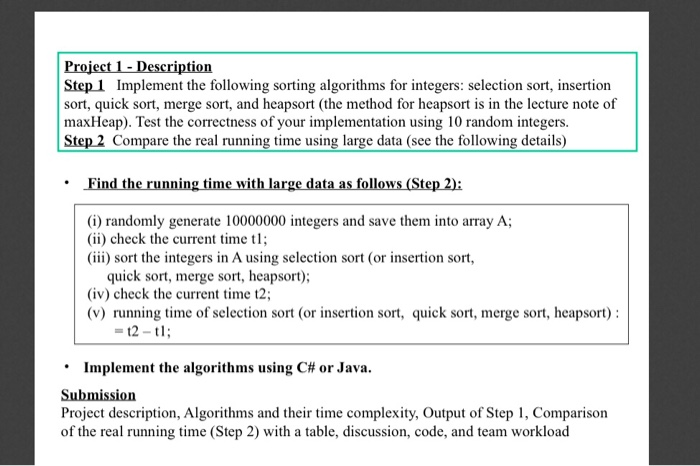Question: I need it in C# code Project 1-Description Step 1 Implement the following sorting algorithms for integers: selection sort, insertion sort, quick sort, merge sort,

Project 1-Description Step 1 Implement the following sorting algorithms for integers: selection sort, insertion sort, quick sort, merge sort, and heapsort (the method for heapsort is in the lecture note of maxHeap). Test the correctness of your implementation using 10 random integers. Step 2 Compare the real running time using large data (see the following details) Find the running time with large data as follows (Step 2): (i) randomly generate 10000000 integers and save them into array A; (ii) check the current time t (iii) sort the integers in A using selection sort (or insertion sort, quick sort, merge sort, heapsort); (iv) check the current time t2; () running time of selection sort (or insertion sort, quick sort, merge sort, heapsort) Implement the algorithms using C# or Java. Project description, Algorithms and their time complexity, Output of Step 1, Comparison of the real running time (Step 2) with a table, discussion, code, and team workload Project 1-Description Step 1 Implement the following sorting algorithms for integers: selection sort, insertion sort, quick sort, merge sort, and heapsort (the method for heapsort is in the lecture note of maxHeap). Test the correctness of your implementation using 10 random integers. Step 2 Compare the real running time using large data (see the following details) Find the running time with large data as follows (Step 2): (i) randomly generate 10000000 integers and save them into array A; (ii) check the current time t (iii) sort the integers in A using selection sort (or insertion sort, quick sort, merge sort, heapsort); (iv) check the current time t2; () running time of selection sort (or insertion sort, quick sort, merge sort, heapsort) Implement the algorithms using C# or Java. Project description, Algorithms and their time complexity, Output of Step 1, Comparison of the real running time (Step 2) with a table, discussion, code, and team workload
Step by Step Solution
There are 3 Steps involved in it

Get step-by-step solutions from verified subject matter experts


